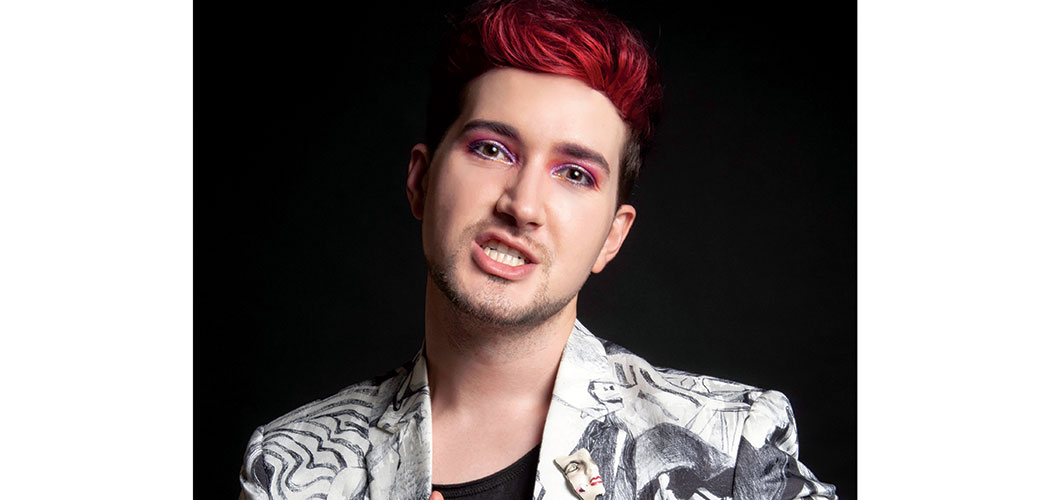The View Upstairs is the hit musical which has recently opened at the Soho Theatre. It’s a time travel story about the Upstairs Lounge, a gay bar in New Orleans, which was the scene of an arson attack which killed 32 people. The show’s writer Max Vernon is in London and spoke to David Bridle about the message of the show for today’s LGBT audiences.
The View Upstairs is based on a terrible attack which happened in New Orleans in the 1970s, can you tell us about it?
It’s inspired by something that took place in 1973 which is the Upstairs Lounge fire. There was a gay bar in New Orleans in 1973 called the Upstairs Lounge that was burnt down, but my show uses the fire in order to have an intergenerational conversation. So it’s really about the contrast between 1973 and 2019.
How did you know about this arson attack, was it a well-known event?
No, actually almost no-one knows about it, even now after my show has had 15 productions in the States, since we created Off-Broadway two years ago, and still very few people know that it happened. For college I did a gender and sexuality queer theory studies for my degree. I was going pretty far down the rabbit hole of theoretical queer studies and by chance, I happened upon learning about the Upstairs Lounge fire on the internet. I think I stumbled into a chatroom somewhere where someone mentioned in a month’s time it’ll be the 36th anniversary of the Upstairs Lounge fire where 32 people died. And at that time, even before Donald Trump was using the words fake news a lot, I thought it was fake news. I thought it was made up because I spent four years studying queer history and I’d never heard of this thing in which 32 people died – which pre-Pulse [nightclub] was the worst attack of its kind in American history.
What happened then?
I brought it to the attention of some of my professors and most of them had not heard about it either. So I flagged it in the back of my head as something that I wanted to research more and understand why do people not know about it? Why has this been forgotten? Originally I set out to write a very clear-cut story of 1973 was bad, and now everything’s getting better. Barack Obama’s our President, gay marriage is going to be legalised, ‘Don’t ask, don’t tell’ is going to be repealed and gays can serve in the military. And then Donald Trump got elected, the Pulse shooting happened, transgender people are getting barred from the military. All of a sudden the pendulum towards progress was swinging back and there was a very conservative backlash. So because of that the show became much more layered in the contrast between 1973 and 2019 in terms of the message of the show.
So did that involve you almost rewriting it?
Yes, I mean there’s a song in the show called “The Future is Great” and originally there is a lyric in it that was “Gay marriage will be legal and of that I’m sure” and then it became “Gay marriage now is legal, though in four years who can say…”. Even though this was the worst fire in New Orleans history, they never arrested anyone for the crime. None of the local politicians or religious figures came out and made any public statements about it. It was in the paper very briefly and then it was gone. There was an active motive or desire to pretend it didn’t happen because it was involving the gay community. In 1973 in New Orleans it was literally illegal to be gay. Even people who were at the bar on the night of the fire, they didn’t even want to talk about it in many cases.

How did you create the characters in the musical?
Based on the research I had done, I created composites of the people who were actually there. I made the decision that it wasn’t my right to use their real names. These weren’t public figures, they were people who were thrust into the spotlight tragically. There’s more materials available now. Robert Fieseler wrote a book about it called Tinderbox which has a lot of details on the people who were there. So if you see my show and then you read a book like that you will definitely recognise who the characters are, but I created my own names for those people to respect them.
Can you describe a few of the characters in the show?
There was a piano player at the bar and many gay bars at the time had their own theme songs. In the case of the Upstairs Lounge their theme song was “United we stand, divided we fall” by the Brotherhood of Man. So one of the characters in my show is that piano player. Also one of the people who passed away in the fire was a woman who was there with her two sons, and in my show I’ve made one of her sons a drag queen who was also a composite of an actual drag queen who performed in that space as well.
Do they know who actually lit the fire and burnt the bar down?
The best evidence of who set the fire was a man named Rodger Dale Nunez who was a gay hustler who frequented the bar, who was kicked out of the bar earlier that night for harassing patrons and being drunk and disorderly. I think that’s also part of why the history is ignored. It would be a more clear-cut narrative if you can just simply say the Upstairs Lounge fire was a hate crime, but it’s actually an example of gay on gay violence and what can happen when you reject people who are vulnerable or not desirable from the community – the ways in which they can lash back out at you.
Was that gay on gay violence difficult to deal with in the show?
I think there’s actually a really interesting parallel between the arsonist character and the main character of my show who’s name is Wes. He’s a fashion designer from 2019 – he’s really ‘fabulous’ – and he buys the destroyed Upstairs Lounge space and he’s going to build a flagship store for his new fashion brand. And so he has flown back into the past and has this experience with this community, but he really doesn’t give a shit. He is all about gentrification, he’s out with the old in with the new year. So in a weird way that character is going to commit an act of violence against his community himself – the erasure of history. It’s like there are two deaths; people say the first death you experience when you die and the second death you experience, once you’re forgotten. Arson has destroyed the space, but he is wanting to erase the entire history.
And in the end does he see it differently?
I think he comes to realise the weight of history bearing on him and how the sacrifices of the people in the past have paved the way for him. And that he has to grab the torch and figure out – in his own way, not in a trite way – he’s got to figure out through his heart, through his creativity how to honour their memory. And I think that’s the message of the show. Some of us are lawyers, some of us are artists, some of us are bankers, some of us are teachers but we all have a role to play, and in our own way we can all find a way to keep rolling the boulder up the hill towards progress. I think what I realised writing the piece over five years as everything went to hell in America, is that there’s no perfect time period to be alive. 1973 was not perfect and 2019 is not perfect. Things are always fucked up and beautiful and in process. There is no perfect time to be alive, but we have to do all we can while we are alive to put beauty into the world and create the kind of spaces we want to live in.
Do you feel The View Upstairs proves the importance of our LGBT history?
One of the things that is a huge shame is that because of the AIDS epidemic, there’s really a link in the chain that’s missing generationally. And I think there’s a real hesitancy between younger and older gay people interacting and talking with each other. I think a lot of older queer people were particularly bitter at the younger generation because they feel like they’re not honouring them. They don’t know the sacrifices they made, they don’t know what it’s like to live through that sheer amount of loss and I think a lot of younger gay people are afraid of that history and the weight of all that tragedy. Especially with technology, I think people are squirrelled away into their own little pockets of the community. There’s not as much interaction happening which is why this piece is so important to me because I really want to kick off an intergenerational kind of conversation – because I really think we need to mend that link in the chain.
The View Upstairs is at the Soho Theatre until Saturday 24th August. Box office: 0207 478 0100 sohotheatre.com














